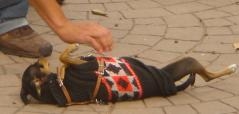Fearfulness

Socializing a puppy to people is the easiest and most enjoyable aspect of raising a dog. On a regular and ongoing basis, puppies need to meet, play with, and be handled and trained by a wide variety of people, especially including strangers, men, and children.
Narrow Window of Opportunity
Old dogs can indeed be taught new tricks. An adult dog may learn basic manners and good behavior (where to eliminate, what to chew, and when and for how long to bark) at any time in his life. However, socialization must occur during puppyhood—during the critical period of socialization, which ends when puppies are 12–13 weeks old. Shy and fearful dogs can be substantially rehabilitated, but they will never develop the confidence and social savvy of a well-socialized puppy. They will never become what they could have been.
Puppy socialization is critical for your puppy to develop the confidence and social savvy to continue socializing with people as an adult dog. Unless your puppy meets unfamiliar people every day, it will become fearful.
After eight weeks of age, puppies start to become shy and wary of unfamiliar people, and between five and eight months of age, they become fearful of strangers, especially men and children. Fearfulness and aggression worsen very quickly, because once a dog becomes fearful or aggressive, socialization stops. If your puppy becomes fearful, his life as a companion dog will be riddled with anxiety and stress and he will be useless as a working, competition, or protection dog.
If you notice any signs of shyness, standoffishness, or fearfulness in your puppy or adolescent dog, seek help immediately. Contact the Association of Pet Dog Trainers (1–800 PET DOGS or www.apdt.com to locate a Certified Pet Dog Trainer (CPDT) in your area.
Neonatal Handling
There is no better time to accustom puppies to enjoy being handled than when they are still neonates. The puppies cannot see or hear, but they can taste, smell, and feel. The puppies recognize and accept the handlers as strangers. What could be easier that inviting friends and family to gently hold, handle, and stroke neonatal puppies? Additionally, the ideal time to accustom puppies to sudden movements and loud, strange, and sudden noises is when the eyes and ears begin to open (between two and three weeks).
Socialization in the Puppy's Original Home
To fully enjoy life as a human companion, a puppy must be taught to thoroughly enjoy the company and actions of all people, especially strangers, men and children. It is not sufficient for puppies to meet the same small circle of familiar friends each day. Puppies need to meet unfamiliar people every day—especially men and children. Before they are eight weeks old—and the critical period of socialization is almost two-thirds over—puppies need to have been handled and trained by at least 100 different people. Puppy socialization and handling exercises are so simple, so important, and so much fun. Each person should use kibble to lure-reward each puppy to come, sit, lie down, and roll over. Then visitors can pick up, cradle, cuddle, and stroke the pups, while looking in their eyes and gently examining their jaws, paws, ears, belly, and private parts.
Remember to maintain routine hygiene: All people should leave outdoor shoes outdoors and wash their hands before handling puppies less than 12 weeks of age.
Socialization in the PuppyDog's New Home
By eight weeks of age socialized puppies will start to become shy and wary of unfamiliar people. Consequently, it is necessary to accelerate their socialization program. During his first month in his new home, a puppy needs to be handled and trained by an additional 100 different people—at least three strangers daily. Puppy handling is still so easy and enjoyable. (Please note: All these exercises will work with adult dogs, they just take much more time.)
Weigh out the puppy's dinner kibble and divide it into bags to give to each guest to handfeed to the puppy. Put a few treats into the men's bags and lots of treats into the children's bags. Each guest will train your puppy for you, using kibble and treats to lure-reward the puppy to come, sit, lie down, and roll over. Each person will also pick up and handfeed the pup, examining his mouth, ears, paws, and rear end, before passing the puppy to someone else. "Pass the puppy" is marvelous game and prepares the puppy for handling and examination by veterinarians and groomers. At the end of the evening, your puppy will love household guests and especially enjoy the company and actions of men and children.
Puppy Classes, Walks, and Parties
As soon as your puppy is old enough, enroll in a puppy class so your puppy may socialize with other dogs and people and fine-tune his bite inhibition. Without a doubt, walking your puppy is the very best socialization and confidence-building exercise. Stop every 25 yards and instruct your puppy to sit (for control), and occasionally to settle down (with a stuffed chewtoy) and watch the world go by. Handfeed dinner when anyone approaches—one piece of kibble for a woman, three pieces for a man, three pieces of freeze-dried liver for each child, and five pieces of liver for a boy on a bike or skateboard. You may allow passersby to handfeed your pup once you have shown them how to lure him to sit to say hello. Above all, don't keep your puppy a secret. Continue to have regular puppy parties at home and invite family, friends, and especially neighbors to meet your puppy. Instruct each person to bring a friend. When you socialize a puppy properly, you will find your own social life improves dramatically.
For a more detailed socialization agenda, read AFTER You Get Your Puppy by Ian Dunbar and Help For Your Fearful Dog by Nicole Wilde.
To locate puppy socialization classes in your area, contact the Association of Pet Dog Trainers.